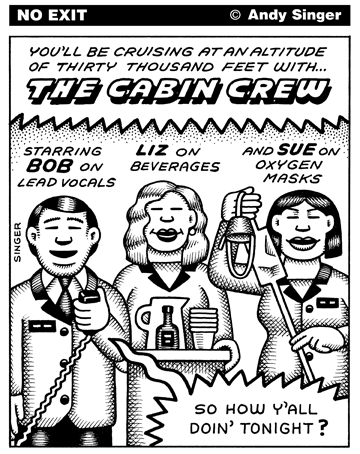Cabin Safety Tips
When you travel by air, what you do before you show up at the airport does a lot to help you avoid any problems during the flight. You don't have to make any major changes in your flying habits, you just have to pay attention to your situation and be ready to do basic things like put on your seatbelt if asked by the flight attendant.
Before the Flight
Don't pack banned or restricted items.
Listen to the pre-flight safety briefing.
Read the safety data card in the seat pocket in front of you.
When in your seat, keep your seat belt on.
Once you reach your seat, locate the closest emergency exit in front and behind you, and then count the seat rows to reach those emergency exits. This will be very helpful in case of evacuation in a smoke filled airplane.
The Role of the Cabin Crew
 The cabin crew is in the airplane primarily for passenger safety. While they are trained to provide amenities such as food and drinks, they are also there to provide the basic safety briefing that happens before every flight.
The cabin crew is in the airplane primarily for passenger safety. While they are trained to provide amenities such as food and drinks, they are also there to provide the basic safety briefing that happens before every flight.
If you are a veteran passenger, you may have heard the basic safety briefing dozens of times, but it is worth paying attention each time because the briefing may be different from the last one you heard because of differences in the route of your flight or in the kind of aircraft your are in. You should also take the time to review the safety card during the briefing to see where are the emergency exits are on your plane.
What to Wear to Reduce your Risks
In the unlikely event of an airplane evacuation via escape slides, synthetic fibers can become very hot due to friction, and melt causing first, second and even third degree burns to the body and legs. The following steps should be taken when traveling to ensure passenger comfort and safety.
- Wear clothes made of natural fibers such as cotton, wool, denim, and leather - These fibers offer the best protection during an airplane evacuation or fire. Synthetics such as rayon, polyester, and nylon (especially in hosiery) can melt when heated.
- Wear clothing that is roomy and comfortable
- Wear long pants and long sleeves - Avoid wearing shorts or skirts since these types of clothes do not appropriately cover extremities.
- Wear low-heeled laced or strapped shoes, boots, or tennis shoes - Shoes made of leather or canvas are preferable. High heeled shoes will have to be removed before leaving the airplane via an escape slide. This will slow your departure from the airplane and put you at risk for severe injury from possible hazards such as broken glass, or metal debris. Avoid wearing sandals for the same reasons.
How to Behave in the Cabin
Once you are flying, you can do other things to keep yourself safe and to reduce your stress, and the stress felt by those around you.
- Keep your consumption of alcohol to a minimum - This makes it less likely that you will get involved in an air rage related intoxication incident. Also,if you are not an experienced drinker, it would be a good idea to learn more about how alcoholism affects the body.
- Stay away from overloaded luggage bins - study of airline passenger injuries from overhead luggage. Bags falling from overhead luggage bins can cause serious injuries, so avoid putting a heavy bag in the bin above you. If someone else tries to put a heavy bag above you, either move the bag or move yourself.
- Use your electronic entertainment with care - If you have a personal entertainment device to play music or movies, wear headphones to cut down on noise pollution, and think twice about playing a movie if it may be disturbing to your neighbors.
- Get up and walk around if you can - On longer flights, you should make an effort to get up an move around the cabin once in a while. This may help you to prevent deep vein thrombosis (DVT), which is the development of a blood clot in your veins. Avoid wearing shorts or skirts since these types of clothes do not appropriately cover extremities.
- If you see something suspicious tell someone - While there is very little chance than anyone will deliberately try to hijack or sabotage your airplane, if you see suspicious activity before or during your flight, including suspicious packages, tell someone. If you are at the airport, tell an airline representative or a security officer. If you are in the air, contact a flight attendant.
Though injury from any kind of cabin mishap is very unlikely, planning ahead and using insurance, such as medical travel insurance that can provide for transportation back home in case of a medical emergency, can help in situations when you need medical attention, and more importantly, give you peace of mind when you fly.
Related Resources:
Turbulence Advice
Baggage Advice
Cabinsafe Cabin Safety Home Page
Cartoon by Andy Singer
http://www.airsafe.com/cabin/cabin.htm -- Revised 13 November 2015
